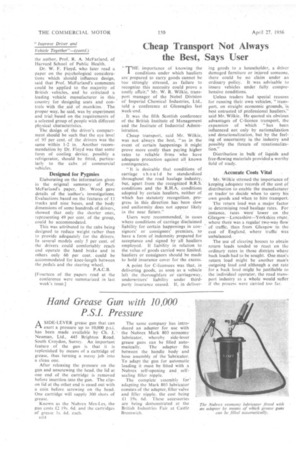Cheap Transport Not Always the Best, Says User
Page 64

If you've noticed an error in this article please click here to report it so we can fix it.
" THE importance of knowing the I conditions under which hauliers are prepared to carry goods cannot be too strongly stressed, as failure to recognize this necessity could prove a costly affair," Mr. W. R. Wilkie, transport manager of the Nobel Division of Imperial Chemical Industries, Ltd., told a conference at Gleneagles last week-end. • It was the fifth Scottish conference of the British Institute of Management and the Institute of Industrial Administration.
Cheap transport, said Mr. Wilkie, was not always the best, "as in the event of certain happenings it might prove more costly than paying higher rates to reliable firms who have adequate protection against all known contingencies.
" It is desirable that conditions of carriage should be standardized throughout the road haulage industry, but, apart from the recognized B.R.S. conditions and the R.H.A. conditions adopted by certain hauliers, neither of which has statutory recognition, .progress in this direction has been slow and uniformity does not appear likely in the near future."
Users were recommended, in cases where conditions of carriage disclaimed liability for certain happenings in consignors' or consignees' premises, to have a form of indemnity prepared for acceptance and signed by all hauliers employed. If liability in relation to the value of goods carried were limited. hauliers or consignors should be made to hold insurance cover for the excess.
A point for C-licensees was that, in delivering goods, as soon as a vehicle left the thoroughfare or carriageway, underwriters' liability under thirdparty insurance ceased. If, in deliver
ing goods to a householder, a driver damaged furniture or injured someone, there could be no claim under an ordinary policy. It was advisable to insure vehicles under fully comprehensive conditions.
Unless traders had special reasons for running their own vehicles, "transport, on straight economic grounds, is best entrusted td professional hauliers," said Mr. Wilkie. He quoted six obvious advantages of C-licence transport, the expansion of which "has been influenced not only by nationalization and denationalization, but by the feeling of uncertainty in the industry and possibly the threats of renationalization."
Distribution in bulk of liquids and free-flowing materials provided a worthy field of study.
Accurate Costs Vital
Mr. Wilkie stressed the importance of keeping adequate records of the cost of distribution to enable the manufacturer or trader to decide when to carry his own goods and when to hire transport.
The return load was a major factor in determining road haulage rates. For instance, rates were lower on the Glasgow—La ncashire—Yorkshi re route, where there was a regular two-way flow of traffic, than from Glasgow to the east of Englandh where traffic was unbalanced.
The nse of clearing houses to obtain return loads tended to react on the ordinary rates in those districts where back toads had to be sought. One man's return load might be another man's outgoing load and although a cut rate for a back load might be justifiable to the individual operator, the road transport industry as a whole would suffer if the process were carried too far.




































































































































